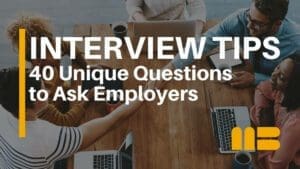Asking the right questions in an interview is as crucial as having the right answers. Unique questions to ask employers reflect not only your keen interest in the role but also your strategic thinking and deep industry insight. At MatchBuilt, our expertise in executive recruitment has revealed that such questions can significantly differentiate you from the crowd.
Make Your Mark with These Key Questions:
- What innovative strategies is the company exploring to stay ahead in the industry?
- How does the company culture empower individual contributions and team success?
- Can you share an example of how employee feedback has shaped company policies?
Leveraging our extensive experience, we’ve curated a list of 40 thought-provoking questions that demonstrate your professional values and commitment. These are not just questions; they are your tools to unearth the company’s core values, challenge your future employer’s norms, and convey your potential as a forward-thinking candidate.
Why Trust MatchBuilt’s Insight?
- Proven Track Record: Years of specialized recruitment experience inform every piece of advice we give.
- Industry Authority: Our team’s deep understanding of the homebuilding sector translates into actionable, insightful guidance.
- Trusted Resource: Professionals rely on MatchBuilt for advice that’s as reliable as it is practical.
Ready to stand out? Let’s dive into the questions that can turn your next interview into a gateway for opportunity—with MatchBuilt guiding you every step of the way.

Why Unique Questions to Ask Employers Matter
- Making a lasting impression: The job market is saturated with candidates who come prepared with standard questions. By asking unique ones, you’re showing the interviewer that you’ve put extra effort into your preparation, which can leave a lasting impression.
- Standing out from the crowd: When you ask unique questions, it emphasizes your distinctiveness and sets you apart from other candidates who might be recycling the same generic questions.
- Showcasing proactive thinking: Unique questions can also suggest that you are a visionary thinker who approaches tasks and challenges from different angles and perspectives.
- Demonstrating genuine interest: By moving beyond the usual questions, you’re demonstrating a deeper interest in the role and the company. It shows that you’re not just looking for any job but a role that truly aligns with your goals and values.
- Tailoring your application: Unique questions can provide insights that help you tailor subsequent interviews or follow-ups, emphasizing how your skills align with the company’s needs.
- Gathering valuable information to decide if the job and company are the right fit: Remember, interviews are a two-way street. Asking tailored questions helps you gauge whether the company culture and role match your expectations and career trajectory.
Guidelines for Asking Unique Questions to Employers
Do’s:
- Engage in Conversations: Your questions should spark meaningful discussions, allowing both you and the interviewer to delve deeper into particular subjects.
- Prepare ahead: Doing your homework before the interview helps you come up with unique questions and signals to the interviewer your genuine interest in the position.
- Seek Clarity: The interview is your chance to clarify any aspects of the role or company you’re uncertain about, ensuring you make informed decisions.
- Ask open-ended questions: These types of questions encourage detailed answers, giving you a richer understanding of the position and company culture.
- Encourage the interviewer to share personal experiences: This makes the conversation more engaging and gives you insights into the unique experiences and journeys of current employees.
- Stay focused on the job role and company: Your questions should reflect a genuine interest in the specific position you’re applying for and how it fits within the broader company framework.
Don’ts:
- Avoid making assumptions: It’s essential to approach the interview with an open mind and not make assumptions based on limited information.
- Avoid asking about salary and benefits in initial interviews: Focus on understanding the role, team dynamics, and company culture first. Salary and benefits can be discussed once there’s mutual interest.
- Don’t jump ahead: While planning for the future is essential, ensure your questions are pertinent to the current interview stage rather than jumping too far ahead.
- Avoid irrelevant questions: Always tie your questions back to the role, the team, or the company. Avoid asking about aspects that don’t directly relate to your potential position.
- Be mindful of time: While getting your questions answered is crucial, respect the interviewer’s time. Prioritize your questions.
- Don’t ask easily researched questions: Your questions should delve deeper than basic company information on their website or recent news articles. Aim for depth and relevance.

40 Unique Questions to Ask Employers in Your Next Interview
1. How does the company measure success for this role?
This question dives deep into the company’s performance metrics. It signals an eagerness to meet and exceed expectations and offers a fresh perspective on understanding the company’s benchmarks.
2. Can you describe the company culture in three words?
Challenging the interviewer to condense the company’s essence in just three words is intriguing. It grants a clear and concise snapshot of the work environment while showcasing your interest in the underlying company dynamics.
3. What types of professional development opportunities do you offer?
You’re broadcasting your commitment to continuous learning by asking about growth avenues. It’s a standout approach that assesses how the company supports its employees’ ambitions.
4. How does the company foster innovation and creativity?
Delving into a company’s innovation practices highlights your forward-thinking mindset. It’s a less common yet insightful avenue to gauge the firm’s stance on novel ideas and creative endeavors.
5. What’s the most significant challenge the department/team faces now?
Highlighting challenges reveals a readiness to address and overcome hurdles. This distinctive query paints a clear picture of the current work landscape and where you could be of maximum value.
6. How would you describe the communication style within the company?
Prioritizing effective communication is paramount. By broaching this topic, you’re signaling the importance of understanding and adapting to a company’s internal dynamics.
7. What opportunities are there for growth within the organization?
A focus on long-term growth and ambition is evident in this question. It’s a strategic way to assess the company’s plans for employee progression and its vision for the future.
8. What recent project the team worked on that was particularly exciting?
Expressing enthusiasm for impactful projects, this query provides insights into the team’s recent milestones. It reflects a genuine interest in being part of dynamic and influential endeavors.
9. What values are most important to the company?
Aligning personal values with a potential employer is essential. This query is actually an insightful route to discern if the company’s core principles resonate with your beliefs.
10. How does the company handle feedback and criticism?
Feedback is a tool for growth. This nuanced question probes the company’s approach to improvement and showcases your understanding of its importance in business evolution.

11. How does the company support work-life balance?
This question underscores the modern emphasis on mental health and overall well-being. It demonstrates a desire to integrate productively within a company while maintaining personal health and boundaries.
12. What do you expect the person in this position to accomplish in the first six months?
By focusing on initial expectations, you’re expressing a proactive mindset, eager to hit the ground running. It shows that you are committed to adding immediate value.
13. Can you tell me more about the team I’ll work with?
A communal approach is evident here. This question showcases an interest in collaboration and the desire to understand team dynamics beforehand.
14. How does the company handle conflicts or disagreements on a project?
Conflict resolution is essential. Your question offers insight into the company’s problem-solving methods, reflecting your awareness of the next challenges.
15. What software, tools, or methodologies does the team use?
This tech-centric query shows that you are keen to be well-prepared and adaptable. It emphasizes the importance of mastering tools for optimal performance.
16. What immediate projects need to be addressed in this role?
Probing immediate challenges signals a readiness to address pressing concerns. It highlights your proactive nature and desire to contribute quickly.
Looking at the bigger picture, this question delves into the company’s future vision. It shows that you are interested in the role and the organization’s long-term journey.
18. How do you onboard new employees, and what does the training process look like?
Expressing curiosity about the onboarding process indicates your focus on a smooth transition and getting acclimated effectively.
19. What’s the biggest opportunity facing the company/department?
This optimistic angle showcases your desire to be at the forefront of growth and innovation. It reflects your ambition to be part of solutions and advancements.
20. How would you describe the leadership style at the company?
Leadership dynamics shape work environments. This question shows a nuanced understanding of the importance of management styles and their impact on teams.

21. Can you give examples of projects that I might be undertaking?
Here, the emphasis is on envisioning practical scenarios, demonstrating a readiness to dive into the specifics of the role.
22. How does the company celebrate team or individual successes?
Valuing recognition and morale, this question shines a light on the company’s culture of appreciation and its methods of acknowledging achievements.
23. How does the company ensure that employees continue learning and growing?
This query probes the organization’s commitment to professional development as a testament to your desire for continual growth.
24. What are some of the current challenges the company faces in the industry?
Focusing on external challenges shows a comprehensive interest in the company’s position in the market, reflecting a strategic mindset.
25. What is the company’s perspective on diversity and inclusion?
This socially conscious question underscores the importance of a diverse workplace. It indicates a commitment to fostering an inclusive and equitable environment.
26. What do you think distinguishes your company from its competitors from a public and employee perspective?
Delving into differentiation reveals your interest in the company’s unique selling proposition. It shows you’re assessing fit not just on a role level but also within the broader market and cultural context.
27. Can you describe a typical day for someone in this position?
This question shows you are eager to visualize daily responsibilities and set realistic expectations. It indicates thorough preparation for the day-to-day aspects of the role.
28. How do teams collaborate across departments?
Exploring inter-departmental dynamics displays your understanding of the importance of collaborative efforts. It shows that you’re trying to integrate smoothly within a multifaceted environment.
29. What are some of the long-term objectives the company is focused on?
By asking about future goals, you’re looking beyond the present, showing your intent to align with the company’s growth trajectory.
This personal touch helps humanize the conversation, indicating your interest in the emotional and cultural facets of the workplace.

31. How has the company adapted to recent industry changes or trends?
Highlighting adaptability, this question underscores your awareness of the ever-evolving nature of industries and showcases your intent to stay relevant.
32. Can you tell me about when an employee’s feedback led to a change or improvement in the company?
Focusing on feedback implementation makes you keenly interested in the company’s receptivity and value for employee input.
33. How does the company prioritize employee well-being and mental health?
This question stresses the significance of a supportive work environment and indicates the growing importance of holistic wellness.
34. What’s the most memorable team-building event the company has organized in the past year?
This question is just to give you some insight into the company’s culture, showing your interest in camaraderie and team bonding.
35. How do employees typically receive feedback on their performance? Is it an ongoing process or more formalized?
Feedback mechanisms are pivotal. This question shows you value growth through constructive critique and are keen on understanding the process.
Highlighting social responsibility, this question displays your interest in the company’s broader societal contributions.
37. What are the most common career paths for individuals in this role?
Expressing a forward-looking attitude, you’re demonstrating interest in potential growth and progression.
38. How does the company incorporate sustainability or other ethical considerations into its operations or decision-making?
Your emphasis on ethics and sustainability indicates a holistic approach to business, reflecting values and modern concerns.
39. What are the next steps in the interview process, and what can I expect regarding the timeline?
This pragmatic question shows that you are eager to move forward and your respect for timelines.
40. Is there a particular company achievement or milestone you’re incredibly proud of?
This query deepens the conversation by inviting personal reflection, indicating your appreciation for notable accomplishments.
Essential FAQs for Inquisitive Interviewees
Why is it important to ask questions during an interview?
Asking questions during an interview demonstrates your interest in the position and company. It also allows you to gather vital information that can help you determine if the job fits you.
In the initial interview, avoid asking questions about salary, benefits, or vacations. It's best to wait until a job offer is made or until the interviewer broaches these topics.
Yes, asking questions that can be easily answered with a quick look at the company's website, such as its history or main products, can make you seem unprepared or disinterested.
While there's no set number, preparing at least three to five thoughtful questions is beneficial. This shows you're engaged without prolonging the interview excessively.
Absolutely, especially if you're being interviewed by different people within the company, you might gain various perspectives on the same topic.
Opt for open-ended questions, as they encourage detailed responses and deeper discussions. Avoid questions that can be answered with a simple "yes" or "no."
If the interviewer naturally addresses one of your questions, you can either skip it or delve deeper into the topic by asking a more specific follow-up question.
The answers can give you insights into company culture, expectations, and potential challenges. Use this information to align your responses with the company's values and evaluate if the role and company are a good fit for you.
Recruiter Thoughts: Empowering Questions for Interviewees to Ask Employers
Navigating the professional landscape demands more than just answering interview questions the right way. It’s also about posing the right questions to gain a deeper insight into potential workplaces. By asking thought-provoking and tailored inquiries, you exhibit genuine interest and empower yourself with vital information. This shift from being merely an interviewee to an active participant can significantly influence the impression you leave behind.
As you enter your next interview, remember that the dialogue is two-sided. Prepare for common behavioral interview questions, harness the power of curiosity, align your values with the company’s, and ensure that while they’re finding the right fit for their team, you’re finding the ideal environment to thrive and grow.
